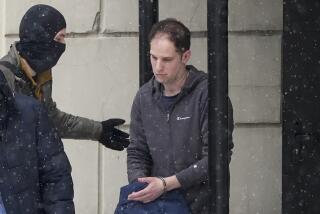Shultz, Shevardnadze Try Again to Solve Daniloff Case, Other Barriers to Summit
- Share via
UNITED NATIONS — Secretary of State George P. Shultz and Soviet Foreign Minister Eduard A. Shevardnadze met for almost three hours Sunday night in an effort to resolve the Nicholas Daniloff case and other issues blocking a superpower summit.
Neither Shultz nor Shevardnadze would talk to reporters, but State Department spokesman Bernard Kalb said, “They discussed the Daniloff issue, and they are still working the problem.”
Kalb refused, however, to elaborate on his cryptic statement.
After similar meetings last week, Kalb had said, “The problem was not resolved.” He refused to repeat those words Sunday.
Asked if the change in language indicated progress, Kalb said, “It’s for you to make the interpretation.”
The Sunday meeting at the Soviet Mission here was the fourth and longest that the two officials have held since they arrived at the United Nations last week. Like the others, Sunday’s session was kept secret until it was well under way.
Shultz and Shevardnadze met a few hours after White House Chief of Staff Donald T. Regan hinted that Washington might be ready to be flexible on a key Soviet demand for smoothing relations between the two countries.
Asked on the CBS-TV program “Face the Nation” if the Administration is unyielding in its expulsion order against 25 diplomats in the Soviet Mission at the United Nations, Regan said, “I’m not sure about every single name. I don’t want to close every single door.”
Shultz had said last week that the expulsion order would not be changed even though Soviet officials have indicated that their price for resolving the Daniloff case includes some modification of the order.
Serious About Expulsions
Soviet Foreign Ministry spokesman Gennady I. Gerasimov said last week that Moscow is as serious about the expulsion order as Washington is about the Daniloff case.
“In your eyes, Daniloff is the obstacle (to a summit),” Gerasimov said last week. “In our eyes it is the expulsion.”
U.S. officials have said that all 25 of the diplomats are KGB intelligence officers.
Under the order, the expelled diplomats must leave the country by Wednesday. Despite Soviet objections, U.S. officials say they expect Moscow to comply with the order because it is a well-established principle of international relations that a host country has a right to demand the removal of individual diplomats working on its territory.
Nevertheless, Soviet anger at the order seems certain to complicate efforts to settle the Daniloff case.
Shultz and Shevardnadze are working against an informal Tuesday deadline because the Soviet foreign minister is scheduled to leave for an official visit to Canada, breaking off his face-to-face contacts with the secretary of state.
Although a Soviet official said that “both sides will be worse for it” if the disputes are not settled before Shevardnadze leaves the country, Shultz insists that he will not rush the talks.
A skillful labor relations bargainer long before he became a diplomat, Shultz told reporters last week that time pressure sometimes causes negotiators to make unwarranted concessions. He said he is determined not to fall into that trap.
“Obviously it is desirable to get the matter settled as quickly as possible if we can get it settled on the right basis,” Shultz said. “Mr. Shevardnadze and I have both worked at having a good personal capacity of talking to one another, so it is certainly useful to have it done while he is here. But that may not be possible.”
Shultz and Shevardnadze met three times, for a total of about four hours, last week at the United Nations. They conferred for a total of 14 hours Sept. 19-20 in Washington.
Shultz returned to Washington to conduct other business on Friday but went back to New York at midday Sunday.
An Administration official said that lower ranking diplomats continued to work on the Daniloff case Friday and Saturday but that additional Shultz-Shevardnadze meetings would be needed to wrap up any agreement
However, the official said that information about the negotiations is scarce even inside the Administration because “George Shultz is being his own Soviet desk officer on this one and he wants to keep things quiet.”
Shultz and Shevardnadze are at the United Nations to confer with the parade of foreign leaders attending the two-week-long “general debate” that marks the opening of the General Assembly each year. For instance, Shultz is scheduled to meet today with Yitzhak Shamir--who will become prime minister of Israel next month under a rotation provision of that government’s coalition agreement--and leaders of Guatemala, Peru, Chile and Argentina.
However, there are some gaps in Shultz’s schedule that could be used to fit in a fifth meeting with Shevardnadze.
Although the United States and the Soviet Union agreed in a flurry of statements last week that recent arms control progress warrants a summit meeting this year between President Reagan and Soviet leader Mikhail S. Gorbachev, the Daniloff case and two related issues have cast a pall over the superpower relationship.
Shultz has said repeatedly that it will be impossible to hold a “fruitful” summit until the Soviets withdraw espionage charges against Daniloff, a Moscow correspondent for U.S. News & World Report. Daniloff was arrested by the KGB on Aug. 30 when he accepted a package in Moscow from a Soviet acquaintance that the KGB said contained military information.
Daniloff’s arrest followed by a week the arrest of Gennady F. Zakharov, a Soviet employee of the United Nations, on spying charges. Moscow has made it clear that it wants to trade Daniloff for Zakharov, but Reagan rejected such a deal because he said Zakharov is a spy and Daniloff is a “hostage.”
Administration officials have said that a straight Daniloff-for-Zakharov swap would make every American without diplomatic immunity in the Soviet Union potential “trade bait” in the event that the FBI picks up another Soviet spy. However, the officials say, Washington would consider trading Zakharov for an acknowledged Western spy or, more likely, one or more Soviet dissidents.
There is little doubt that both sides have agreed in principle to the general outlines of such a deal, but the details are extremely complex and could take a long time to complete.
More to Read
Sign up for Essential California
The most important California stories and recommendations in your inbox every morning.
You may occasionally receive promotional content from the Los Angeles Times.









